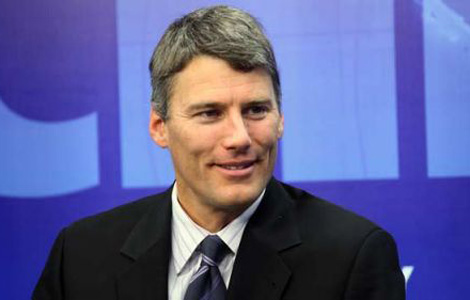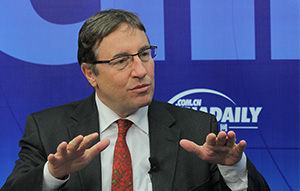Obama's legacy at stake in Iran nuclear talks
Updated: 2013-11-13 01:47
By JULIE PACE in Washington (Agencies)
|
|||||||||||
US President Barack Obama's hopes for a nuclear deal with Iran now depend in part on his ability to keep a lid on both hard-liners in Congress and anxious allies abroad, including Israel, the Gulf states and even France.
Each of the wary parties is guided in some measure by domestic political interests. But they also share concerns that Obama may want a breakthrough with Iran so badly that he would be willing to accept a deal that prematurely eases economic pressure and gives the Islamic republic space to pursue a nuclear weapon.
"All of us want to see diplomacy," Republican Senator Bob Corker told NBC News. "But we're also concerned about an administration that seems really ready to jump into the arms of folks and potentially deal away some of the leverage we have."
There's little question Obama desires a deal with Iran, which could give him a boost during a shaky stretch in a presidency that has included the deeply flawed rollout of his signature healthcare law, new revelations about US government spying and falling approval ratings. Successful negotiations with Iran also could validate Obama's long-held belief that the US should be willing to talk to adversaries without preconditions.
Obama and his advisers reject the notion that they are naive about Iran's intentions. And they insist the world must test whether new Iranian President Hassan Rouhani is serious about his announced desire for improved relations with the West.
Colin Kahl, who served as a top Pentagon Middle East official during Obama's first term, said the very fact that the success or failure of a nuclear agreement would be so critical to Obama's presidency ensures the administration won't sign off on a subpar deal with Teheran.
"The president sees preventing Iran from getting a nuclear weapon as not only central to vital US national security interests but also to his own legacy," said Kahl, now a senior fellow at the Center for a New American Security. "They're not going to accept a bad deal."
Talks between Iran and six world powers — the US, France, Russia, China, the United Kingdom and Germany — ended over the weekend without an agreement on a preliminary deal that would have set the stage for broader talks. Diplomats said talks broke down in part because the international powers refused to formally recognize Iran's right to enrich uranium.
Related Stories
China welcomes Iran nuclear inspection deal 2013-11-12 18:56
Iran to give UN inspectors more access to nuclear sites 2013-11-12 07:28
Iran nuclear talks fail to reach deal 2013-11-11 07:32
IAEA chief visits Iran for nuclear talks 2013-11-11 19:21
Today's Top News
Key CPC meeting rolls out reform agenda
Data indicates China's recovery on firm footing
Tombs from three dynasties discovered in Xi'an
Man robs shop for 'a quiet period' in jail
Survey: 67% don't trust doctor
Iran to give UN more access
Global talent lacking in China
Online shopping sets records
Hot Topics
Lunar probe , China growth forecasts, Emission rules get tougher, China seen through 'colored lens', International board,
Editor's Picks

|

|

|

|

|

|





